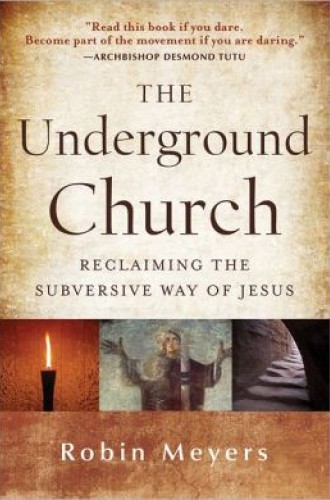The Underground Church, by Robin Meyers
The whole time I was reading Robin Meyers’s The Underground Church, I couldn’t shake the presence of Old Testament scholar Walter Brueggemann, and I kept trying to figure out why I kept writing “WB” (Walter Brueggemann) as often as “NB” (nota bene).
The goal of The Underground Church is to wake up the church to its primal calling to be radical and therefore dangerous, to be edgy, powerful love-in-motion. Meyers’s prose helps him achieve his objective, for it is itself dangerous and edgy and powerful. In the book, Meyers faces off against trammeling myths of and within the Christian tradition, against the suffocating security of a safely played faith, and against the “pleasantification” of what is, at root, a movement of protest. The effect, Meyers hopes, is that a religion of recited creeds will become instead—or rather, become again—a religion of impassioned trust in the way of Jesus.
Read our latest issue or browse back issues.
This way, believes Meyers, invites people into a habit of radical encouragement, love, patience and boundary breaking, habits of mind and heart that bear upon the church, upon the family and upon the affairs in the world at large.
Perhaps most disorienting for many will be his proposition that liberal and conservative Christians partner in mutual ministries that have political and social consequences. Under the provocative heading “If the Church Were Christian,” Meyers sets up a long litany of rhetorical jabs at a church that prefers protecting its turf, defined by narrowly defined moral precepts, over finding common ground and engaging in wide-sweeping prophetic speech and action.
Meyers, a theologian in the United Church of Christ, has a Brueggemannian knack for placing phrases on the plate of the page as if they simply belong there, like basil and mozzarella and tomatoes with a splash of balsamic vinegar and olive oil and a side of crusty bread to help the reader savor the point.
Listen to this effective account of fourth-century ecclesial fornication:
So when conservatives hail the gravitas of the early church’s fourth-century “conquest” of the imperial city, they betray their own long-standing belief that the church and state should not sleep together. But when liberals assume that at Nicaea, a hitherto undefiled movement of spiritual seekers was raped by the sword of patriarchy, they neglect the evidence that in the absence of a Second Coming and with thousands of new converts, the church had for decades been moving, metaphorically speaking, from folding chairs to pews. If Rome did indeed seduce the church at Nicaea, the bishops went dressed for the occasion.
That’s nicely vivid. But it isn’t only Meyers’s piquant rhetoric that brings Brueggemann to mind. So does his impulse to return to the texts. The texts include scripture, to be sure, but also those of tradition and of popular assumption. Meyers takes the reader back in time for another look-see and then another one, and perhaps one more, and then gives us not only a new view but the stunning realization that a re-vision quite probably means a new vision.
Not least of all, Meyers is convinced that the early church was itself fundamentally underground by way of conviction and practice, set against the powers that be. Meyers wants people committed to “a God of nonviolent distributive justice,” not to a God “of violent partisan favoritism.” He is convinced that by and large the church is kneeling at the wrong altar to egregiously bad ends.
In a beautiful section reconsidering the Eucharist, Meyers bends our minds both backward and forward:
Let us also never forget that communion is a subversive act. When Jesus prayed to heaven to bless the food he offered, he stood against the Roman Empire, whose rulers maintained their power by controlling the distribution of bread to the poor. In the Underground Church, the Eucharist needs to recapture these same anti-imperial roots.
And there’s where it finally struck me: I couldn’t shake Walter Brueggemann’s presence on these pages mostly because of the word subversive. Subversiveness is the substance of this book, and what is Brueggemann if not subversive?
In Deep Memory, Exuberant Hope: Contested Truth in a Post-Christian World, Brueggemann writes that preaching is:
a sub-version because we must fly low, stay under the radar, and hope not to be detected too soon, a sub-version, because it does indeed intend to sub-vert the dominant version and to empower a community of sub-versives who are determined to practice their lives according to a different way of imagining.
Obviously, Meyers wants to encourage preachers to be partners in subversiveness. But just as much, if not more so, he wants to enlighten and embolden laity to, as Kant said, “sapere aude!”: to have courage to think, to wonder and to act. And Meyers wants clergy and laity to imagine. There is hardly a thing more powerful than subversive imagining. In the last pages of The Underground Church, the heading “So Just Imagine . . .” leads the reader down a list of powerfully courageous, innovative and radical ways of being a faith-filled (as opposed to certainty-filled) community.
I have two misgivings about this work, however—qualms that grow from my training as a theologian and my experience as a rural pastor in a rural state.
First, Meyers calls the underground church, present in, through and beyond denominations, “a movement of the spirit, not an organization that seeks to perpetuate itself, convert disciples to a certain belief system, or make cosmic promises based on human calculations.” It’s a great manifesto, except for that bit that implicitly seems to rebuff the vocation of the theologian—or, perhaps better said, the art of theology.
I am a systematic theologian, so I happen to have some affinity for the notion of belief systems. I’m not convinced that they’re all that bad. A belief system gives us a framework for thinking, for sifting, for holding ourselves accountable. When we are aware of our own belief system, we have a scheme for discerning another’s system for belief and action. A belief system might even be honorably summed up in a creed of sorts, perhaps even like the one Meyers himself ends up imagining and plotting out for others.
It’s clear that Meyers has a right and righteous fear of dogmatism. I’m just not convinced that knowing and teaching and embracing dogma necessarily makes one dogmatic. In fact, I think that Meyers’s own work proves my point.
My second concern has to do with how we become this subversive, underground church. Last summer I led a few sessions for a Presbyterian gathering of new church developers. Attendees often said that it was tough to create a new community, but they knew that they had a far easier job than those who are faced with changing an old one. It’s tough work, being in a changing church culture while striving to change church culture. A pastor can acknowledge and even embrace the noble ideas presented in this book, but it is still tough work to get these imaginings to hop off of the page and into the reality of an established congregation. Of course, it’s not supposed to be easy. But knowing how something can be done is also a matter of knowing whether it can be done—and sometimes, whether it should be.
Interestingly, much of Meyers’s book describes the underground church in the future tense. Perhaps he’s not quite sure how it will happen either, even if he’s fairly sure about what it should look like. He does cap off the last chapter with these words: “This much we know: God requires justice for all creation, and hospitality is an open table, with enough for everyone and no reserved seating.”
The point of The Underground Church may be that we should begin a collective imagining of the subversive and establish the foundations of courage to create it.







